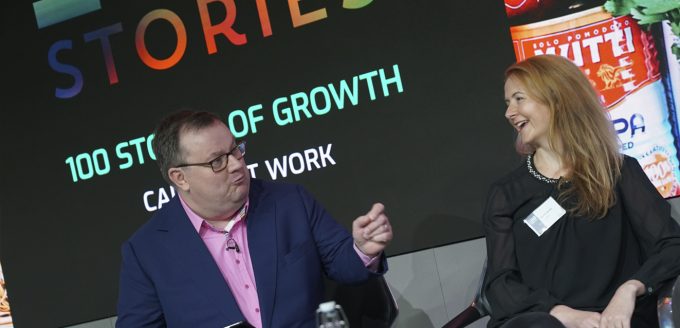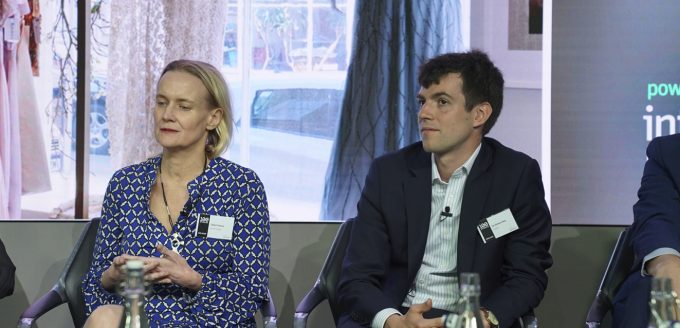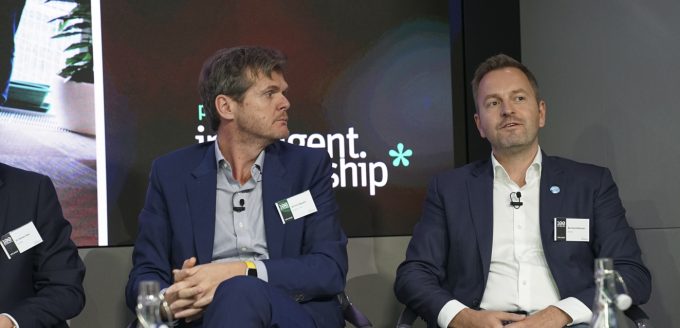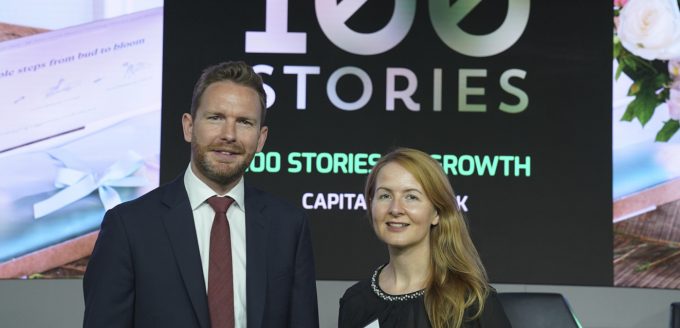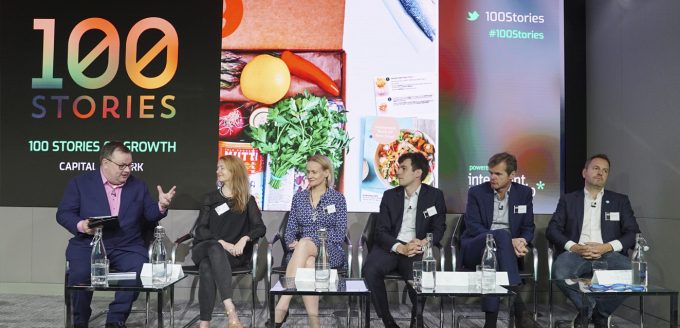100 Stories of Growth: Founder panel highlights
Moderated by independent business commentator Declan Curry, the 100 Stories of Growth June 6 launch event featured a panel of well-respected founders and CEOs whose businesses touch and improve many of our lives every day.
The panellists discussed four key themes emerging from our proprietary research.
They explored the role of equity and investment in driving business growth; female founders, diversity and talent; accessing the right financial capital for growth; and finding the best emotional support and promoting wellbeing and mental health for business leaders and their teams.
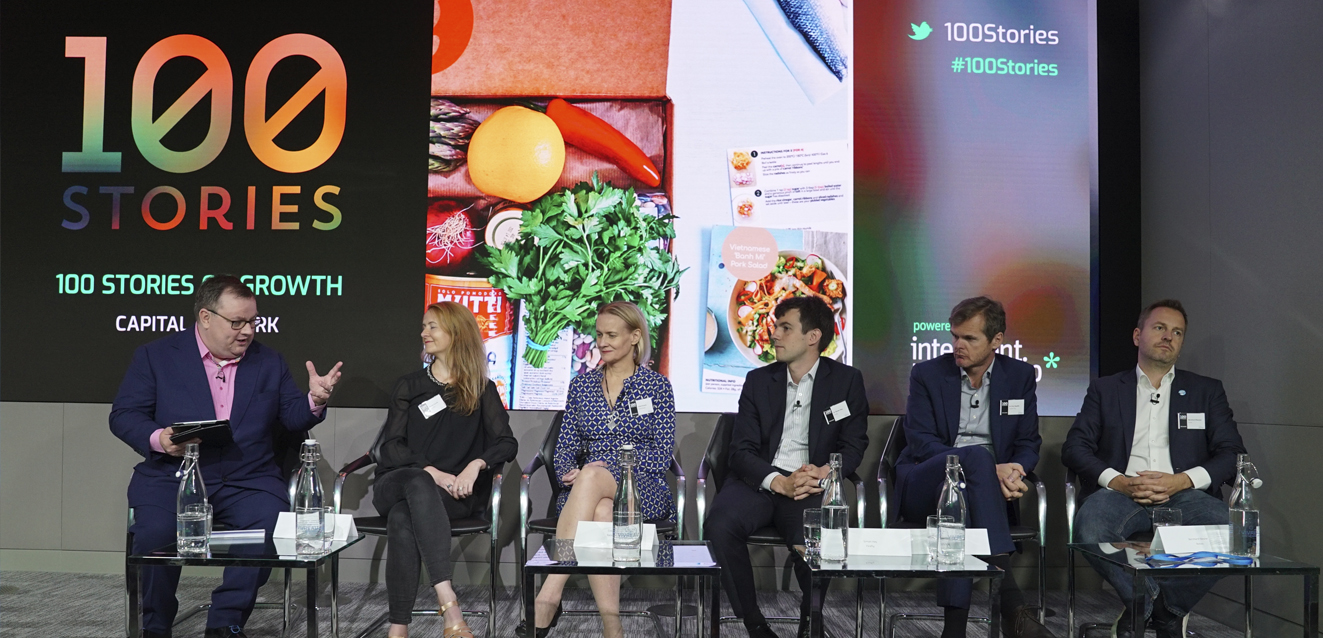
(Far left to right) Declan Curry, independent business commentator; Rachel Carrell, founder and CEO, Koru Kids; Celia Francis, CEO, Rated People; Simon Hay, co-founder, Firefly; Kris Naudts, founder and CEO, Culture Trip; and Bernhard Niesner, CEO and co-founder, busuu
Panel Highlights
EQUITY-FUNDED BUSINESSES ENJOY GREAT GROWTH PROSPECTS
Equity investment has to the power to help businesses grow more rapidly than many which are funded by bank debt and cashflow. Our panellists reveal how equity capital facilitates their growth ambitions.
Kris Naudts, Founder and CEO, Culture Trip
What did the company’s recent $80m equity fundraise offer the company? “It allowed us to buy an extended version of the belief that we had in the company in the early days. Borrowing from a bank would not have had the same impact,” he says.
“We’re at an awkward stage – at the end of the start-up phase and at the beginning of our scale-up journey. But we are very ambitious and aim to compete with companies like Netflix and Disney.”
Rachel Carrell, Founder and CEO, Koru Kids
“Having just raised £3.5m in equity, we’re not limited by cash, market need or demand. Our customers generally love us, but they get frustrated with us because we haven’t launched new products in places like Oxford. Management bandwidth is our limitation.”
“Our vision is to provide childcare as a managed service, using tech to join up nanny services, babysitting, and tutoring. Right now, our main focus is building out the product offering and the tech,” she says.
Simon Hay, Co-founder, Firefly
Having raised £4.5m in Series A equity in 2016, Firefly is now looking to raise more equity. “We’re just scratching the surface of what is possible in edtech product wise. Bringing traditional offline activities brings productivity gains and saves time and money.”
“What really excites me is what we can do next. How can we take advantage of the terabytes of data to improve decision-making and how we can encourage teachers to give feedback that was never possible on paper.”
DO FEMALE FOUNDERS INVEST MORE IN SKILLS AND TALENT?
The panel discusses a key them emerging from the research that female founders are more likely to prioritise investing in workplace skills and talent. But does a binary view of gender-based management behaviour cloud the reality of running a diverse fast-growth business?
Celia Francis, CEO, Rated People
“I have a belief, which is deeply held, that both men and women bring wonderful things. Everyone is different. My company is very diverse and its Noah’s Ark-like characteristics span the whole team.”
“I think it’s important to think of this debate in terms of diversity of style. My team is an even split of males and females, and they have different racial and national backgrounds.”
“It’s really about looking at the individual and seeing what they bring to the team.”
Bernhard Niesner, CEO and co-founder, busuu
“The business skirted with a near-death experience a few years ago that was brought about by having the wrong team and culture. We lost three-quarters of our team in a few weeks. It taught me the importance of building the right culture.”
“With clearly defined values and a culture manager in place today, busuu’s culture is totally different from what it was four or five years ago. Culture is essential for sustained growth,” he says.
Rachel Carrell, Founder and CEO, Koru Kids
“I’m amazed that anyone, male or female, would say that skills and talent are not a vital ingredient. For our team, being a parent is a real plus because it allows us to identify with our customers.”
“There’s a huge pool of women with young children who would like to work three days a week. Because I knew this, I created some roles to attract some great talent at an affordable rate.”
“I interviewed 30 amazing candidates after advertising the role on job-flexibility recruitment websites. I ended up giving the job to the best candidate – a white man – who wanted job flexibility because he was writing a novel two days a week.”
Simon Hay, Co-founder, Firefly
“As my High Street bank manager used to remind me, we have no assets apart from a bunch of smart people and some very good ideas. The intellectual capital that you develop is built by a world-beating team of individuals.”
FINDING THE OPTIMUM APPROACH TO FINANCIAL CAPITAL
More founders and business leaders would like to focus more on customers and less time on raising funding or finance. Many believe they have had capital-raising issues because they weren’t sufficiently ‘investor-ready’. What do the panellists believe?
Bernhard Niesner, CEO and co-founder, busuu
“Fundraising is not a sign of success. Especially in tech, it’s overrated. There have been countless examples of start-ups that have raised too much cash and the founders have been left with a tiny bit of equity.”
He says that busuu has grown through cashflow and a modest amount of equity ($17.3m).
“There is a lot of money out there and investors are very keen to get into start-ups.”
“Fundraising is another skill a founder needs to have like sales and marketing. To support founders, there are fantastic programmes like the ELITE programme at the London Stock Exchange,” he says.
Simon Hay, Co-founder, Firefly
“We bootstrapped Firefly up to 30 people before we took any external capital at all. We were lucky to be able to do that because we have reliable revenue streams.”
“If you can build a business with a set of proofs, this is likely to be appealing to more types of investors as well as giving you more flexibility and control,” he says.
“One set of investors will help you find the next. It took a lot of cups of coffee when we were raising our series A funding to find out what investors risk-return approaches were.”
“We’ve just started another fundraising round and one of the great things about it is being able to focus on all the good things about the business.”
Rachel Carrell, Founder and CEO, Koru Kids
“All investors clearly have different risk profiles, and I don’t think enough is talked about that at the start of the relationship. Project that out five or 10 years and it becomes utterly vital in terms of how success and failure are perceived,” she explains.
“Raising money is always meant to be a struggle. I had baby in the middle of my latest fundraise and I wouldn’t recommend it.”
“Family offices can be fantastic for funding, but terrible at marketing. It’s normally via word of mouth. There’s an element of discovery in all fundraising. And other forms of financing, like venture debt, are much misunderstood.”
Celia Francis, CEO, Rated People
“Rated People has a number of peer companies globally in the home repairs and maintenance category, and we’re the market leader in the UK.”
“In the US there is a very strong premium on raising money as a decoration, that you’ll be the winner. My peer companies in the US have raised between $50m and $110m, but we’ve raised $14m and our revenues are bigger.”
“In the UK, the approach is to tread carefully, remain profitable and see how it goes. In the US, they go for it, hoping to be the big winner.”
Kris Naudts, Founder and CEO, Culture Trip
“Funding is not a right. People think they are entitled to capital just because they have an idea,” he says.
“There is a lot of money out there, but raising it on the right rates and terms is a wholly different story.”
“We’ve gone through our prudent approach at Culture Trip and now we’re focused on pumping in the financial capital. We’re not going to become a global leader by taking a constrained approach.”
OPENING UP THE DEBATE ON EMOTIONS, WELLBEING AND MENTAL HEALTH
Many company founders rely on their board members – who they acknowledge as a “very good” source of support – and others look to their investors and professional services providers for support. When it comes to emotional support, founder wellbeing and mental health, the debate needs to open up.
Rachel Carrell, Founder and CEO, Koru Kids
“My very first employee and my husband are very supportive. It’s amazing to think how you could possibly survive the founder rollercoaster without the support of your partner,” she says.
“I draw a huge amount of support from founder networks. A group of eight of us spend three hours a month together – it’s a bit like a coaching session and in a very structured approach. If we turn up late we get fined and we miss the group we would get kicked out. We can be very honest and authentic together and I’ve never experienced such a supportive group.”
“The Koru Kids team is still only 25 people. We’ve had lots of issue of people going through family, personal, anxiety and mental health issues. I’ve encouraged people – to the extent they are comfortable with it – to talk openly about their experiences. You have to have an underlying culture to support this approach, and if they do, it’s an amazing reinforcer of that culture.”
“If you broke your arm and had to take two days off work, there would be no stigma associated with that. If we talked about someone in the same tone of voice who’d shared the fact that they’d just had a panic attack and needed to take two days off, then that’s sends a really important message to everyone. That’s a basis of trust we need.”
Bernhard Niesner, CEO and co-founder, busuu
“You need a tot of resilience and emotional strength to get up the next day after some disaster and go into the office and smile to your team,” he says.
“Being with other entrepreneurs who are going through the same thing is extremely supportive.”
“Also, we’ve given stock options to top advisors and senior management and derive a lot of value-add support from them.”
Celia Francis, CEO, Rated People
“I am a member of a number of secret founder societies. But professional advice is not the same as emotional advice. When you’re a CEO you’re never allowed to whinge and you always have to maintain your confidence and vision for the company.”
“I actually pay people to talk to, to go through particular issues I may be having with someone in the company or something else. I see someone who is a cross between a shrink, a coach and a meditation-type person. It’s my way of talking through what I’m going through.”
